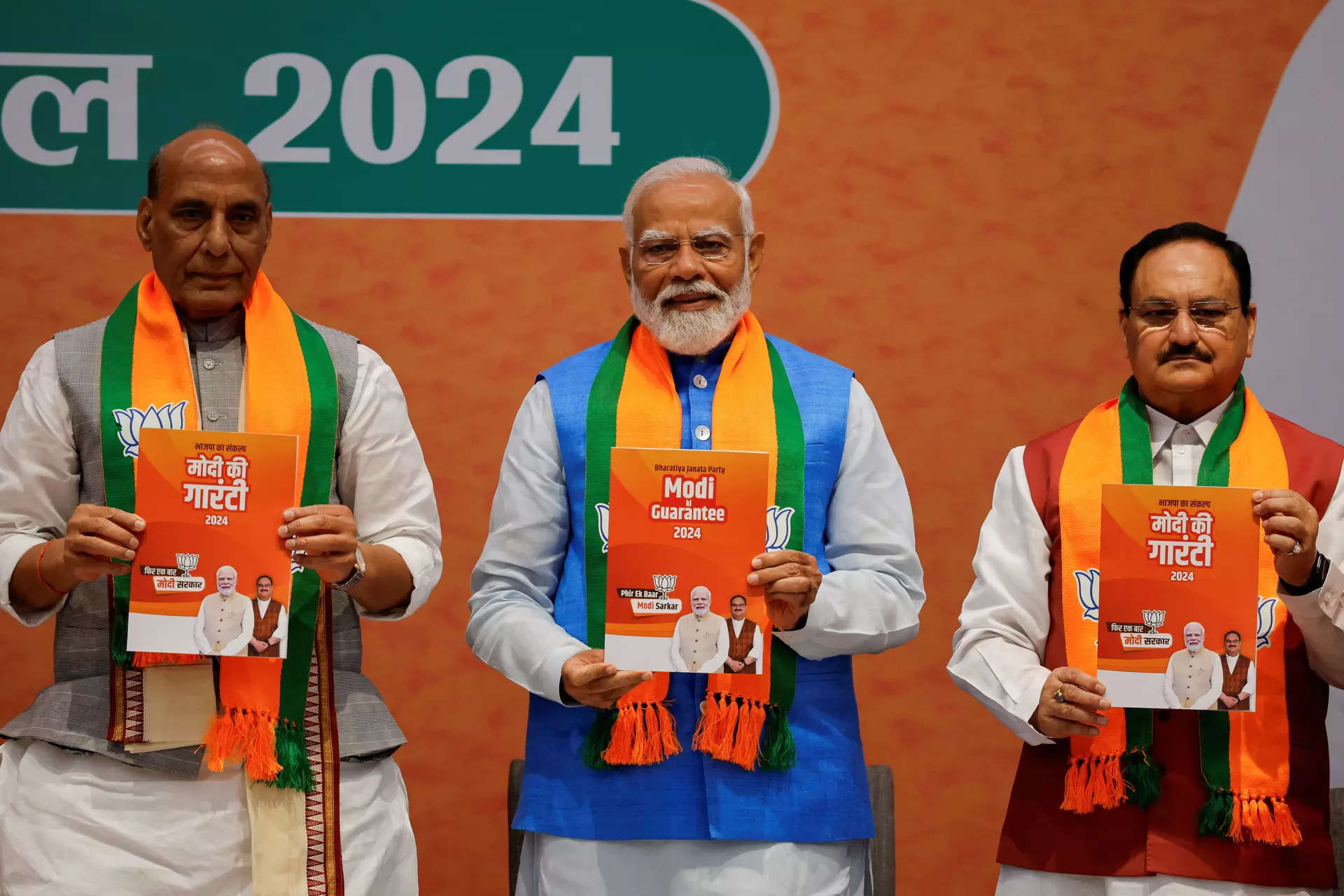BJP's election manifesto a blueprint for economic growth; over 40 stocks to be on investors watchlist
Investors analyze BJP's manifesto for economic changes and governance reforms. CLSA and UBS highlight infrastructure focus, governance reforms, and stock market impacts. BJP's policies create opportunities for specific industries. Stock recommendations include sectors like tourism, EVs, and natural gas.
As India gears up for another round of elections, investors are closely watching the policy promises put forth by various political parties, particularly the ruling Bharatiya Janata Party ().Recent analyses from financial institutions like and shed light on the and its potential impact on the stock market.
CLSA's assessment underscores the BJP's focus on structural economic changes aimed at propelling India towards becoming a developed nation by 2030.
Central to this vision is a robust emphasis on infrastructure development to transform the country into a global manufacturing hub.
This ambitious agenda could translate into significant opportunities for companies involved in construction, engineering, and related sectors, potentially driving stock market performance in these segments.
Furthermore, the BJP's commitment to governance reforms, including the implementation of a uniform civil code and advocating for one nation, one election, signifies a move towards streamlining administrative processes.
CLSA also highlights the BJP's adherence to conservative supply-side economic policies, prioritizing macro-financial stability through high growth, low inflation, and fiscal prudence.
While such policies may provide a stable economic foundation, their implications for specific sectors within the stock market could vary.
Industries aligned with the government's economic agenda may witness sustained growth and investor interest, while others may face challenges or adjustments in response to policy changes.
On the other hand, UBS's analysis underscores the continuity aspect of the BJP's manifesto, emphasizing Prime Minister Narendra 's track record and the party's commitment to maintaining policy consistency.
This assurance of stability could provide a sense of security to investors, potentially bolstering market sentiment and encouraging capital inflows - ‘Modi Guarantee’.
However, it's essential to note the contrast between the BJP's approach and that of its political rivals, particularly the Congress party and regional outfits.
While the BJP manifesto prioritizes structural reforms and economic continuity, opposition manifestos, such as Congress's "Nyay Patra," exhibit a more populist orientation.
The absence of detailed financial implications in the Congress manifesto raises questions about fiscal sustainability and market repercussions, introducing an element of uncertainty for investors.
Stocks & Sectors To Buy:
PhillipCapital lists out stocks and sectors that are likely to benefit the most:
The BJP manifesto has focused on multiple fronts, benefiting multiple sector and stocks:
1) Affordable housing (AH): Positive for banks (HUDCO), metals (major steel players), NBFC (entire AH), and cement (UltraTech and Ambuja Cement).
2) Tourism: Hotel (Indian Hotels and other larger players), aviation (entire industry) and NBFCs (credit-card players).
3) Railway infrastructure (new and enhancement): Major steel players; APL Apollo, JTL, Surya, Hi-Tech.
4) EVs: Auto manufacturers (Tata Motors, TVS Motor) and NBFC (Shriram Finance, Sundaram Finance and Chola).
5) Auto-parts suppliers: Motherson and Sona BLW.
6) Mudra loan limit expansion: PSB, SFB and MFIs.
7) Working capital to MSME: Shriram Finance, MasFin (NR) and Bajaj Finance.
8) Natural gas: Gas (GAIL, Petronet LNG, IGL, Mahanagar Gas, Gujarat Gas, Adani Total Gas) and pipes (Welspun Corp, Maharashtra Seamless, Ratnamani Metals).
9) Increase crop MSP: Tractors (Escorts Kubota and M&M) and NBFC (MMFS, Chola, Shriram Finance and Sundaram Finance).
10) Har Ghar Jal Scheme: Jindal Saw, Welspun Corp, Electrosteel Castings (NR), Hi-Tech, JTL Industries, Surya, and APL Apollo
11) Pharma (boosting mfg. and research capacities, expand RLI schemes): Divis, Syngene, Suven, Ami Organic.
12) FMCG (rural recovery): Major beneficiary (Dabur, Emami and Bajaj Consumer); modest for HUL, Colgate and Britannia.
13) PM-eBus: Ashok Leyland, Tata Motors, JBM Auto, Olectra Greentech.
(Disclaimer: Recommendations, suggestions, views, and opinions given by experts are their own. These do not represent the views of the Economic Times)
Source: Stocks-Markets-Economic Times
